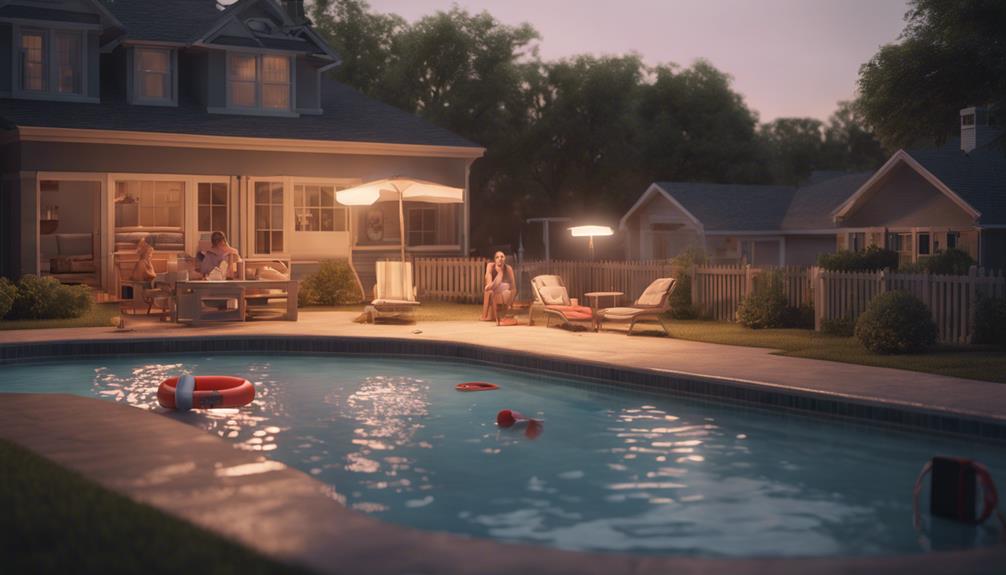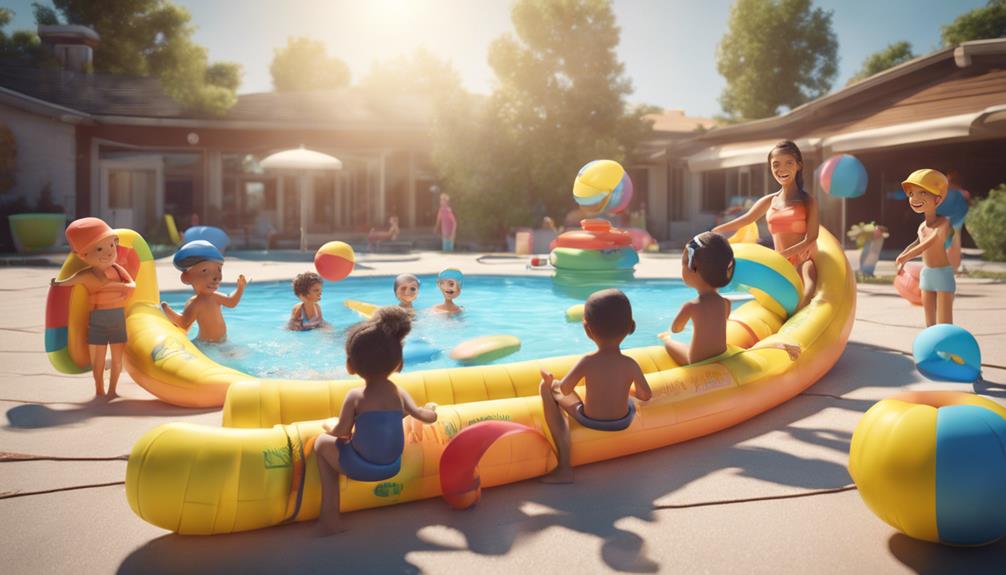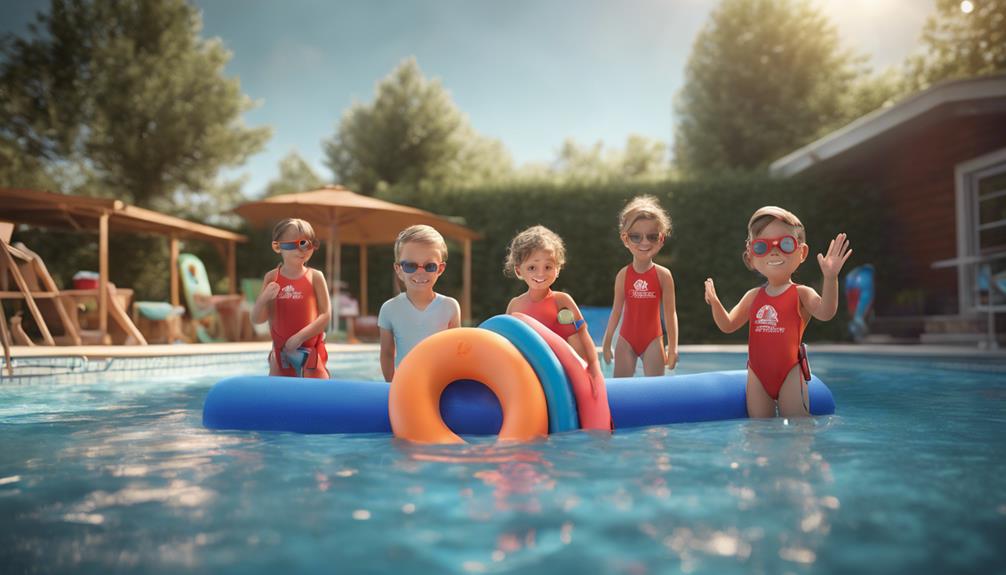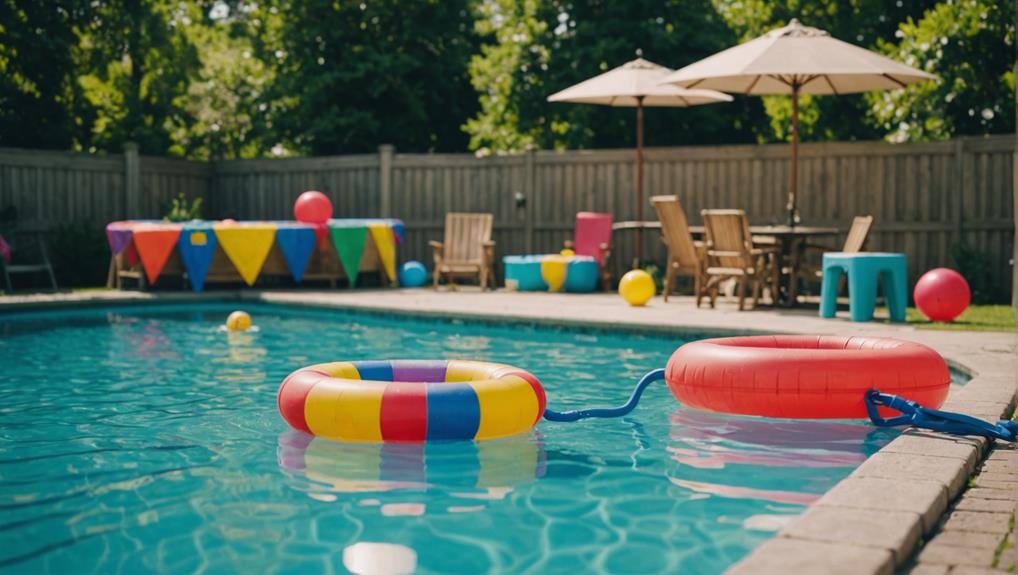When it comes to kids and pool time, having the right safety equipment in place can literally be the difference between life and death, as it provides a critical layer of protection against drowning and other pool-related accidents. You know that life jackets or floaties are essential for kids who are still learning to swim or aren't strong swimmers, giving them confidence to enjoy the water while staying safe. But it's not just about the gear – you also need to provide close supervision, teach pool safety skills, and guarantee your pool area is safe and secure. And that's just the beginning – uncover the full range of essential safety measures you need to take to keep your kids safe around water.
Key Takeaways
- Life jackets provide added buoyancy and support, giving kids confidence and safety while learning to swim.
- Properly fitting flotation devices are crucial to prevent accidents and near-misses in and around the pool.
- Overconfidence in flotation devices can increase the risk of accidents, emphasizing the need for close adult supervision.
- Pool safety equipment, such as life jackets and fences, can significantly reduce the risk of drowning and other accidents.
- Ensuring kids wear properly fitting life jackets can help prevent tragic accidents and create a safe pool environment.
Personal Safety Essentials for Kids
When it comes to guaranteeing your kids' safety around the pool, what's the most vital piece of equipment you can provide them with? The answer is simple: a properly fitting life jacket.
Life jackets or floaties are essential for children who are still learning to swim or aren't strong swimmers. They provide added buoyancy and support, giving your kids the confidence to enjoy the water while staying safe.
However, it's vital to remember that life jackets aren't a substitute for close supervision. You should always keep a watchful eye on your kids when they're in the pool, even if they're wearing a life jacket.
Additionally, be cautious not to let your kids become overconfident when wearing flotation devices, as this can increase the risk of accidents.
Pool Safety Features and Maintenance
As you focus on pool safety features and maintenance, you'll want to prioritize two critical areas: pool fencing requirements and pool chemical storage.
You'll need to guarantee your pool fence meets specific standards to prevent accidental access, and that you're storing cleaning chemicals in a safe and secure manner.
Pool Fencing Requirements
Regularly, pool owners neglect to install a fence around their pool, which is a crucial mistake that can have devastating consequences, especially when it comes to preventing accidental drowning.
As a responsible pool owner, you should prioritize pool fencing requirements to guarantee the safety of your kids and others. A fence around the pool is a critical factor in drowning prevention, and pools without fences are much more dangerous because access to unsupervised children can't be controlled.
When installing a fence, make sure it surrounds the pool completely with a wooden fence at least five feet high, and the vertical slats are no greater than three-and-a-half inches apart.
The gate should be self-closing and self-latching with a latch no less than 54 inches from the ground to prevent children from accidentally opening it.
Remember to check with local authorities to determine the specific regulations in your area, as pool fencing requirements vary by state and locality.
Pool Chemical Storage
You must store pool chemicals safely and securely to prevent accidents and guarantee the well-being of everyone around the pool.
When it comes to pool chemical storage, you can't be too careful. You should store cleaning chemicals in a locked location to prevent accidental mixing and production of chlorine gas, which can be harmful to children and adults alike.
Keep children away from the pool when adding chemicals to prevent inhalation of chlorine gas, which can cause respiratory problems and other health issues.
Verify that all pool chemicals are stored in their original containers and are clearly labeled to avoid confusion and accidents.
Regularly inspect chemical storage areas to confirm they're well-ventilated, dry, and free from spills or leaks that can contaminate the surrounding area.
Always follow the instructions on the chemical labels and take necessary safety precautions when handling pool chemicals to minimize the risk of accidents and injuries.
Emergency Preparedness and Response

Proper emergency preparedness and response are crucial to preventing pool-related accidents from turning into tragedies. As a pool owner, it's imperative to take proactive measures to safeguard you're prepared in case of an emergency. Enroll in a water safety class to learn proper rescue techniques and hands-on practice using rescue equipment, such as reaching and throwing devices.
| Emergency Preparedness | Response |
|---|---|
| Enroll in a water safety class | Learn proper rescue techniques |
| Confirm reaching and throwing devices on site | Practice hands-on rescue equipment use |
| Post CPR instructions and have a well-stocked first aid kit | Recognize signs of distress |
| Learn to recognize signs of someone in trouble in the water | Shout for help and alert lifeguard (if present) |
| Have a water watcher and pool alarms | Call emergency medical services or give 2 minutes of care before calling 911 |
Supervision and Education for Safety
While emergency preparedness and response are vital, they're only effective when paired with vigilant oversight and education, which can substantially reduce the risk of pool-related accidents.
As a responsible adult, it's imperative to supervise your children when they're in or around the pool. For toddlers, constant touch supervision is recommended, while for multiple children, you can assign adult water watchers with 10- to 15-minute shifts. Remember, lifeguards aren't babysitters, and even when they're on duty, you should still provide close supervision and enforce pool rules.
To guarantee your children are safe in the water, consider the following:
Supervise, supervise, supervise: Keep a watchful eye on your kids when they're in or around the pool.
Teach pool safety: Educate your children about pool safety, such as staying away from pool drains and wearing life jackets.
Enforce pool rules: Establish and enforce clear pool rules to prevent accidents.
Provide swimming lessons: Consider enrolling your children in swimming lessons to help them develop a lifetime of fun in the water while learning to swim safely.
Swimming Lessons and Water Classes

When it comes to teaching your kids how to swim, you'll want to ponder enrolling them in swimming lessons or water classes.
These classes can help your little ones learn essential water safety skills, such as entering and exiting the pool safely, and even basic water rescue techniques.
Learning to Swim
You can substantially reduce your risk of drowning by taking swimming lessons or water classes, which teach essential water skills and build confidence in the pool.
As a parent, it's vital to provide a safe environment for your child around water. Every child should know how to swim, and it's recommended to start them in swimming lessons by the age of four. Young children, in particular, need close supervision when they're swimming, and lessons can help them develop the necessary skills to stay safe.
Water entry and exit: Your child will learn how to safely enter and exit the pool, reducing the risk of accidental falls.
Floating and recovering: They'll learn how to float on their back and recover to a standing or swimming position.
Swimming with assistance: Your child will practice swimming with assistance, such as using a kickboard or pool noodle.
Basic water skills: They'll develop fundamental water skills, including blowing bubbles, using their arms and legs to move through the water, and understanding basic water safety rules.
Water Acclimation Classes
As you take the next step in your child's water safety journey, consider enrolling them in water acclimation classes, which provide a gentle and fun introduction to the pool environment.
These classes are perfect for young children, even as young as two years old, who can learn to hold their breath underwater, blow bubbles, and coordinate arm and leg movements.
When selecting a water class, look for well-qualified instructors who are certified in CPR and have passed a swimming instructors course. This certifies they can provide proper guidance and supervision, which is essential for kids' safety in the water.
Local swimming pools or health clubs often offer swimming lessons with personal instructors who can provide one-on-one attention and constant contact when in the water.
Remember, young children require this individualized attention and should never be assumed to know how to swim, regardless of teaching method or instructor.
Pool Safety Fundamentals for Parents
By supervising their children during pool time, parents can substantially reduce the risk of accidents and near-misses. As a parent, making certain is vital to understand that pool safety is a top priority to keep kids safe.
By taking proactive measures, you can protect children from potential dangers lurking around the pool area.
Always supervise: Keep a watchful eye on your child within arms' reach, especially if they're not strong swimmers.
Slip-resistant surfaces: Verify the pool deck and surrounding areas are slip-resistant to prevent slips and falls.
Fence the pool: Install a fence around the pool to prevent accidental entries and reduce the risk of drowning.
Learn CPR: Take the time to learn basic CPR techniques to respond in case of an emergency.
Teaching Pool Safety and Awareness

Your child's understanding of pool safety rules and procedures is crucial in preventing accidents and ensuring a fun, safe experience around the pool.
As a parent, teaching your child the importance of pool safety and awareness from a young age is imperative. Start by explaining the basics of safe swimming, such as entering and exiting the pool properly and understanding the concept of buoyancy.
Make sure your child knows that children and adults should always supervise each other when in or around swimming pools. Emphasize the need for properly fitting flotation devices and the added layer of protection they provide.
Warn your child about the risk of slips and falls around the pool area and the dangers of Sun exposure. By teaching your child these crucial pool safety rules, you're sure your child will develop good habits that will last a lifetime.
Frequently Asked Questions
Why Is Water Safety Important for Children?
You understand that water safety is vital for kids because it prevents child drownings, fatal injuries, and pool accidents, while promoting water confidence through swimming lessons, water awareness, and aquatic programs that foster healthy childhood development.
Why Is Pool Safety Important?
You understand that pool safety is vital because it prevents pool hazards, accidental drownings, and water risks that can lead to fatal incidents, emphasizing the importance of safety measures, drowning statistics, and lifesaving devices to mitigate pool emergencies.
What Is the Most Important Part of a Pool's Safety Program?
What's the most critical aspect of a pool's safety program – isn't it obvious? You guarantee proper training for pool operators, hire safety inspectors, and implement effective barriers, while adhering to safety regulations, conducting regular safety audits, and performing emergency response drills.
What Safety Equipment Is Required for a Pool?
You'll need to install essential safety equipment around your pool, including pool fences with secure gate latches, safety signs, pool nets, rescue equipment, drain covers, and depth markers, as well as pool alarms to guarantee a safe swimming environment.
Conclusion
By prioritizing essential pool safety equipment, maintaining a safe pool environment, and educating your kids on pool safety, you're well on your way to creating a fun and secure space for your little ones to enjoy.
Don't think, 'My kids are good swimmers, they'll be fine.' Even strong swimmers can get tired or caught in a current.
Stay vigilant, and with these measures in place, you'll substantially reduce the risk of accidents and create a lifetime of happy memories by the pool.

I’m Max, the founder and chief pool enthusiast behind Pool Pro Tips. As a passionate pool owner and cleaning expert, I created this website to share my knowledge and experience with you, helping you to keep your pool sparkling clean and safe for years to come.

